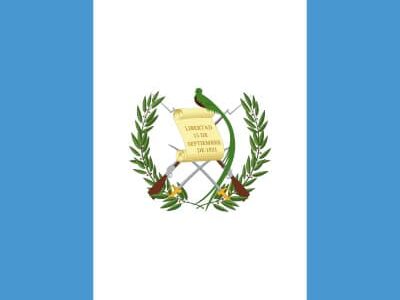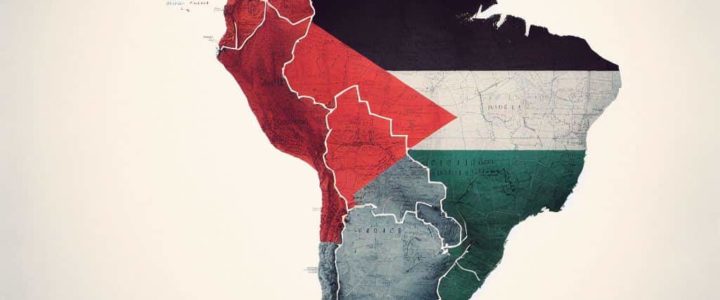Let us start off with some hard figures:
Source: ‘We have been ignored’: Palestinian diaspora in Guatemala responds to Jerusalem embassy move
Mondoweiss – an anti-Zionist souce.
Rory MacDonald
July 10, 2018The Palestinians in Guatemala are approximately 200,000 strong, making them the third largest Palestinian population in Latin America behind Chile and Honduras (with communities of 500,000 and 250,000 respectively).
While the number of Palestinians in Guatemala is 200,000, the number of Muslims in Guatemala is only around 1200: (Click Here – 2025). What this means, by inspection, is that almost all of the Palestinians in Guatemala come from Christian stocks – over 99% Christian, constituting a 200 to 1 advantage over Muslims in the group. These Palestinian-Guatemalans en toto constitute a little over 1% of Guatemala’s population.
Yet, unlike Chile, where the Palestinian-Chileans have incredible power – and hijacked the Chilean government’s position to be against Israel – in Guatemala the government is very pro-Israel.
Posted on YouTube: February 18, 2022
The friendly relationship of Guatemala and Israel dates to the history of aid given to the Guatemalan Government by the Israel government in the past.
Source: ‘We have been ignored’: Palestinian diaspora in Guatemala responds to Jerusalem embassy move
Mondoweiss – an anti-Zionist souce.
Rory MacDonald
July 10, 2018When Guatemala stopped receiving arms from the U.S. in the late 1970s, its relationship with Israel strengthened. Israel stepped into the void as Guatemala’s biggest arms supplier and military advisor, with their weapons and training methods aiding the massacres that were perpetrated at this stage of the Guatemalan civil war (which lasted from 1960 to 1996). By the 1980s, roughly 300 Israeli military advisers were working in the country to bolster their ally’s army.
NOTE: One has to factor that Mondoweiss is an anti-Zionist source. So it can spin history. Still the background cited above is accurate.
What is amazing is that Palestinians in Guatemala – like the Palestinians in Chile – are so heavily Christian, yet identify with an Islamist cause in Palestine.
One has to remember that the bible speaks of nations, and Christians think in terms of nation-states. Islam speaks of a greater Islamic homeland, a caliphate. Muslims are not as comfortable with the concept of nationality, but rather think in terms of religion.
Think of the antiquated term: Christendom. Yet, in spite of a sense of general religious connection, Westerners prioritize national identification over a general religious affiliation. Protestant England still fought Protestant Germany.
The opposite can be true in the Arab mindset.
So Palestinian Christians may see the struggle with Israel as a national cause while the Muslims see the Palestinian struggle as a Holy War.
The Palestinian-Guatemalans’ support for the Palestinian cause may not be for the same reason that Muslims support Palestine. Palestinian-Guatemalan Christians may not realize that – were the Palestinians to win – the victorious Muslims would not treat Christians in Palestine as equals, but as dhimmis, even worse than they think Israel would treat Christians. This is a myopic miscalculation on the part of the Palestinians in Latin America.
Still, like the Palestinian-Chileans (Chilestinians/Chilestinos in Spanish) in Chile, the Palestinians of Guatemala also have risen to the status of elites, in spite of past prejudices.
Source: Palestinian Diaspora in Central America- A Story of Hardship and Success
bethlehem.org
Manzar Foroohar
page 49Following an early period of hardship, Palestinian immigrants to Central America established prosperous businesses and, in a relatively short time span, joined the dominant class in the commercial structure of their host countries. In the late 1910s in San Pedro Sula [Honduras], for example, Arab merchants, 95% of them Palestinians, “controlled major sectors of the city’s elite structure, especially large commerce.”
Their commercial success led to some official discrimination against them for a while; and ironically, their rise in society was similar to that of the Jews in America.
Source: Palestinian Diaspora in Central America- A Story of Hardship and Success
bethlehem.org
Manzar Foroohar
page 53 & 54With the growing economic power of the Palestinian communities in the 1920s and 1930s, it was probably inevitable that the local elites would come to see them as economic rivals and try to isolate them socially and politically. Because Palestinian success was most visible in Honduras, the situation was especially acute there.
However, today the Palestinians of Central America are fully integrated into society, and they are elites. However, their social cohesion has disappeared.
Source: Palestinian Diaspora in Central America- A Story of Hardship and Success
bethlehem.org
Manzar Foroohar
page 56At present, descendants of early Palestinian immigrants are completely integrated into their host societies and are an important part of national life and social, political, and cultural institutions at all levels. Traditions such as intergroup marriages and concentrations of Palestinians in the same neighborhoods are few and far between. The price for Palestinians of full integration, however, has been the loss of their culture, especially the language and knowledge of their past. Today, the majority of Palestinian descendants marry non-Arabs; it is difficult to find Palestinian families without non-Palestinian members. Most Palestinian descendants do not speak Arabic, although they might use some Arabic words and phrases.
Yet, the Palestinians of Chile intermarried and maintained some cohesion.
Three reasons might explain the differences.
1) The Palestinians in Chile, at 2-1/2% of the population, are a larger demographic.
2) The army and the government of Guatemala feel in debt to Israel.
3) Guatemala has a slightly larger Evangelical (usually pro-Israel) population than Chile.
However, though some Palestinian-Guatemalans are upset with the government of Guatemala, they cannot hijack the government’s foreign policy regarding Israel and Palestine, like the Palestinian-Chileans (Chilestinians/Chilestinos in Spanish) have hijacked the Chilean government’s foreign policy in Chile.
Of course, there are other reasons, but the difference between Chile and Guatemala, which both have noticeable Palestinian demographics, is an interesting distinction.





